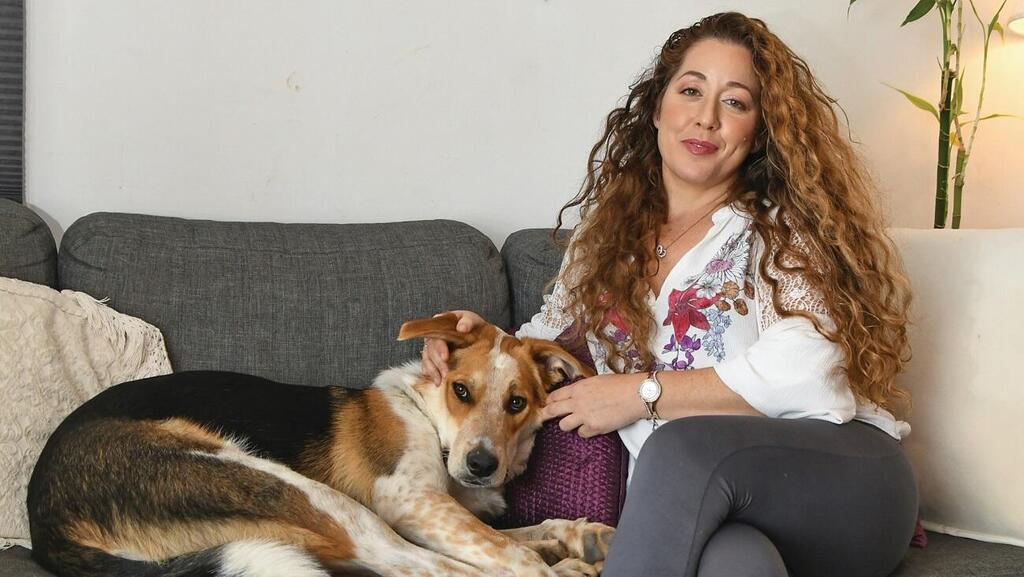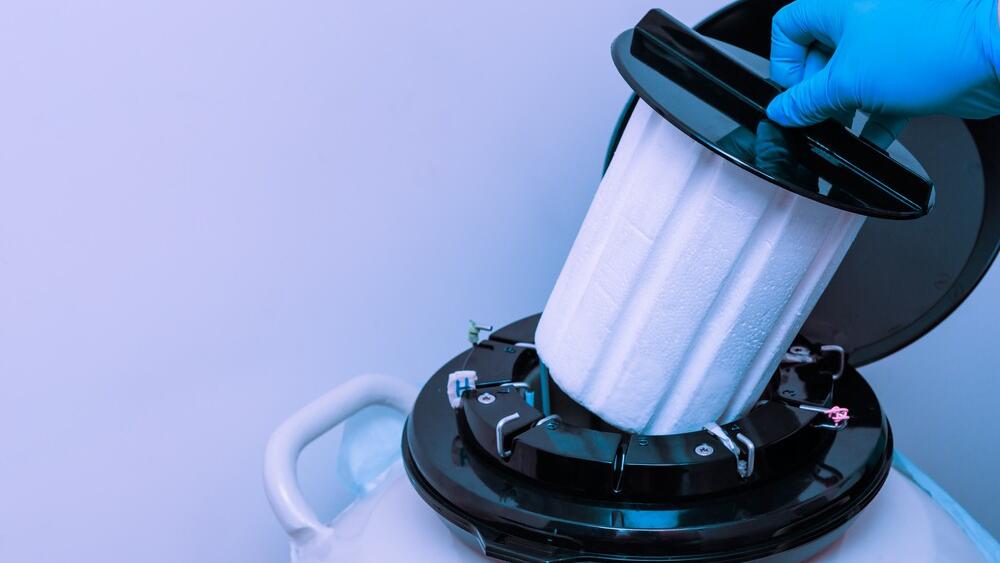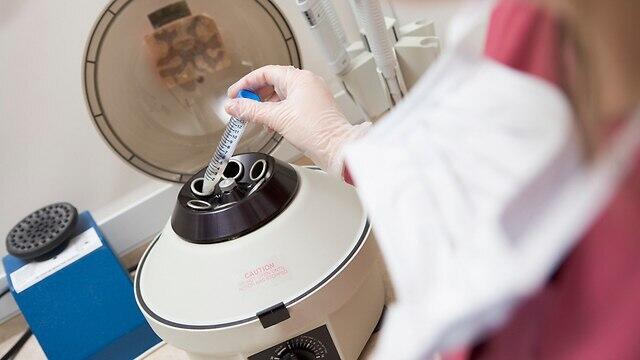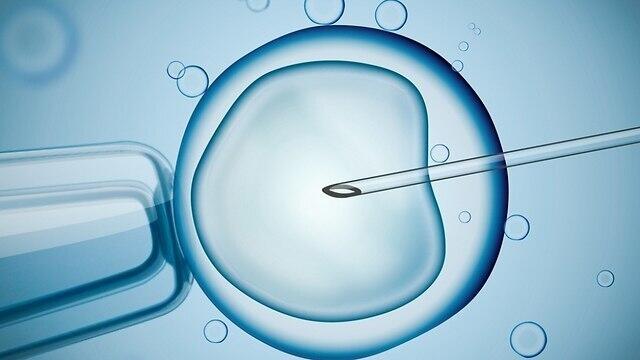Getting your Trinity Audio player ready...
Three years ago, 39-year-old Aviva Klein, a yoga teacher and holistic therapist who lives in the northern Israeli town of Menahemia, decided she wanted to have a second child.
She was already the mother of a son, who was born during a previous relationship she had. After her relationship with her son's father ended, she went on many dates but did not find a steady parner.
"At 36, I came to the conclusion that even if I met someone, it would take time for us to have a child together, and I didn't want the pressure to be my reason for having another baby," she says. "I knew I could look for a relationship all my life, but my biological clock was ticking down.”
At the time, Klein met a friend who introduced her to the Facebook group "Another Family," a group that numbers 2,500, in which men can offer to donate their sperm for free.
"I read posts in the group and realized that co-parenting is not for me. I don't want to share a child with someone, or have the man taking my child away from me, a couple of times a week,” she explains.
"It's impossible to know who your real partner is, and if I deal with the wrong person, it could ruin my life. Since I run a household alone, I wasn't afraid to have another child without a partner."
Klein says that she didn’t want to use a sperm bank in order to have her second child.
"I live a healthy lifestyle and don't take any medication. I knew I was fertile and preferred to conceive naturally, without medical intervention. I didn't see any reason to approach a sperm bank. Also, I heard from my friends that the process was very expensive and I knew it wasn't for me."
Klein wrote a post in the Facebook group and received hundreds of messages from men who volunteered to donate sperm to her without any demand from their side.
Were you surprised by the response?
"Yes. There are many men who are willing to do it, like those who genuinely want to help a woman conceive. That's a real donation, unlike that of a sperm bank.”
You then met with one of the men who wrote to you
"I wanted to see that he was a normal person and intelligent. He told me about himself and didn't hide anything. We both had genetic tests done, he also had blood and urine tests with normal results. He didn't ask for money. I saw that his motives were pure, so I went for it."
What did you do about the legal aspect?
"Before I met the donor, I spoke with an attorney specializing in family law, who told me that no matter what agreement we would sign, courts would allow me to sue for child support, and the father to demand custody of the child. So, I preferred to make a verbal agreement based on trust,” Klein explains.
“I don't know what tomorrow may bring. Many people warned that the father might suddenly want to be part of the child's life, but I said that if that were to happen I would deal with it. There is no guarantee that this relationship between us will work forever."
In their second meeting, Klein and the donor had intercourse in an attempt to conceive. "It was weird," she says, "it was all calculated, but it ended up being good." Amazingly, the first try was successful and she now has a two-year-old son.
So, you’re thinking about having a third child?
"Yes, I believe I’ll be fine, maybe I'll have to watch my finances. There’s worry in a marital relationship as well, I’m simply going with my desire to expand my family naturally without allowing fear to stop me."
Klein’s story is one in a spreading phenomenon of women who want to have a child with donated sperm naturally, and not through government or private sperm banks out of a desire to know who the father is, due to the high costs of sperm donations - which can cost upwards of NIS 800 - or due to a loss of trust in sperm banks.
"After having a medical emergency a few years ago, I stay away from doctors if I can," says Ilya (assumed name). "Due to my medical history, it’s best for me not to get pregnant, so, my partner and I decided that she would try to conceive.
“It was important for us to see who would help us bring a child into the world,” she says. “There's something nicer about dealing with a donor, not a sperm bank - and we have more control over the process."
She is a 35-year-old schoolteacher, who lives with her partner in Haifa. When they first wanted to have a child, the couple asked their friends to spread the word that they were seeking a sperm donation. When that didn't work, they turned to a private sperm bank and purchased donations, “which were unbelievably expensive," she recalls.
"The process was also invasive,” Ilya says. “You have to do everything on their terms, and the insemination process was done in a sterile clinic under fluorescent lighting. The sperm bank sent us to a fertility specialist who charged us NIS 1,200 for a consultation.
“She was a b**** with overly long fingernails, and I thought to myself, 'there's no way someone like that completes the process successfully.' It was very expensive and hurt our morale. We’re both more holistic and believed that our chances of conceiving in that manner were low.”
At that point, the two women thought about starting a process of co-parenting, which they eventually dismissed because it would have meant having a life-long relationship with someone.
The couple sent emails to all their friends and wrote that they were looking for a private sperm donation. "Surprisingly we encounter a lot of resistance from the LGBTQ community who told us to just go to a sperm bank. Many lesbian women who went to the sperm bank didn’t understand why we thought the process was bad," she says.
They then turned to sperm banks abroad and registered on a website called Co-Parentmatch, where for a monthly fee they could see men from all over the world, willing to sell their sperm.
"It's like a dating app, you browse and see sexy pictures of donors from New Zealand, England, and more. There are donors with big egos who travel the world to spread their seed, which is creepy,” Ilya explains.
The two found a man who was interested in donating sperm. "He saw it as a calling," Ilya says. They made arrangements and the man arrived and stayed in Israel for the process at their expense, and didn’t ask for payment for his donation.
The three of them then signed an agreement that absolved the donor of any financial or physical responsibilities, alongside any paternal rights.
They made six attempts to conceive using a syringe but with no success. After a few months, the two flew overseas to the donor to try again. "This time we paid him because he missed days at work for us, but it didn’t work. We’ve spent a lot of money on the process, sperm donations, flights, and hotels. It's not easy, but we're happy we chose this process."
"We're now looking for a donor in Israel,” she explains. “I hope more men will be willing to donate sperm. We’re willing to pay a healthy man who wholeheartedly wants to donate his sperm. We want a volunteer and professionals who know the fertilization process is a complex and gentle one, so they need to use more than just their medical skills when treating women."
Gali (assumed name), an event organizer who lives in Germany with her girlfriend had also received a private sperm donation. "I've always known that if I choose to have a child, I'll want to know who the father is," she says.
How come?
"I wanted my child to grow up without questioning who his father is. The fact that sperm banks in Israel aren’t regulated properly also influenced our decision,” Gali explains.
“A sperm donor can donate to one bank up to a certain amount and then donate to another bank. It's like a business, not to mention the high costs of sperm donations. In addition, I didn’t see the need to involve medical professionals in the matter,” she says.
“I believe fertility treatment procedures are rigid and stressful. It's not a pleasant way to get pregnant. I wanted to experience a connection with my body and soul in a way that allowed me to control the situation, rather than relying on the medical system."
Where did you end up finding a donor?
"We wrote about it to everyone we know. It was important to us that the donor come through someone we are close to,” Gali says.
“We received many offers when suddenly, I got a message from a gay man we know from Israel who is also living in Germany. 'I feel like we need to talk,' he wrote to us. The three of us met several times to see if our expectations matched,” she explains.
“People we talked to in Israel warned us about the process, so we had some concerns. But after a few meetings, we calmed down, and it was clear that we were on the right path."
Did the legal aspect of the process worry you?
"After consulting a legal organization in Germany, we understood that we cannot be legally safe if my partner didn’t adopt the child. If a child has only a single parent, the biological parents can ask for paternity rights,” Gali explains.
“On the other hand, the donor isn’t legally safe either, because we may one day demand child support, so everything in the process is based on trust. Private sperm donations are only suitable when there is a trustworthy partner on the other side, in my opinion.”
Did you ask him to complete genetic tests?
"I did my own genetic tests in Israel and found out that I am a carrier of some disease, so he went to confirm he wasn’t a carrier as well. We knew he was regularly tested for STDs and that he made sure to have protected sex."
How did you proceed?
"For a while, I tracked my menstrual cycle to know when I was fertile. The three of us met where he lived. It was an amazing evening: the three of us drank champagne, ate chocolate, then my partner and I went for a walk while he ejaculated into a cup and told us to come back.
“I transferred the sperm into the syringe and inseminated myself. Luckily, it worked the first time," Gali recounts.
Did he have any contact with you since?
"He shared the excitement of the pregnancy, we kept him updated. As of today, our connection is great. We meet once every few months. He's our girl's 'uncle.' She loves him and calls him by his name, and knows he helped bring her into the world.”
Why do you think private sperm donations are becoming more popular?
"It has to do with the price and medical incompetence in fertilization units in Israel. The family unit has become more fluid, especially in Germany, where a family is no longer only comprised of a mother, father, and children. This allows everyone to ask what kind of family they want.”
One of the few private sperm donors in Israel talking to Ynet says he has helped many women with his donations.
Why did you decide to privately donate your sperm?
"I understand that this is the greatest gift I can give to another person, and there’s a difference between receiving sperm from someone you know rather than a medical catalog,” he explains.
“When a woman wants to start a family, she’s pursuing one of her deepest desires. When this happiness is found, it gives me immense satisfaction. The women who receive my sperm appreciate my help, it’s an amazing feeling."
And you do it all for free?
"I was given a large sum of money as a thank you once, and I returned it. Since then, I make it clear that I don't want money or gifts. Many women say that sounds too good to be true. I understand them."
Do you sign a written agreement with the women you donate to?
"It's necessary. There were those who didn't want to read the agreement and just want the donation as soon as possible.”
The agreement includes his commitment not to sue for paternity and the women’s commitment not to demand child support. The child may choose to make contact once he or she turns 18.
The donor explains that he might be naïve in believing the woman he donated his sperm to would not file court cases against him in the future, but that he wants to believe that “these women won’t choose to harm me after the happiness I help them achieve.”
“Since the sperm bank in Israel is subject to the laws of the country – specifying that sperm donations must be anonymous – the court won’t accept an agreement made between parents of an unborn child,” says Eymi Bechor-Bouni, an attorney specializing in family law.
Why is that?
"For two reasons. Agreements cannot be made without legal persons, a sperm and an embryo do not qualify a legal person, so such an agreement will not be binding for the child, who is a third party to the agreement,” she explains.
“Secondly, the child’s welfare is considered above all else, and therefore the father could be exposed to legal action demanding child support payments.”
What can you do to protect yourself in such an agreement?
"A contractual agreement, which is an agreement between two parties regarding potential damages, whereby if someone sues the father in relation to his donated sperm, the mother will be required to compensate him,” Bechor-Bouni explains.
“There are also other agreements that create a contractual system related to damages caused to the donor. While the court will not approve an agreement regarding an unborn child, there is no reason not to recognize a financial agreement between two parties."
"A sperm donor candidate must be fit in terms of appearance and hygiene," Dr. Shimi Barda, head of the sperm bank in Tel Aviv’s Sourasky Medical center, says. "He must have no family background of severe genetic or mental illnesses and undergo comprehensive testing, including semen analysis, genetic testing, and blood counts."
Dr. Ofer Fainaro, head of the sperm bank and IVF unit at Rambam Medical Center adds: "Public sperm banks operate under the supervision and cooperation of the Ministry of Health. The donor's tests are performed anonymously and include semen analysis, blood tests, serology for infectious diseases, and genetic testing.”
“In addition, our team meets with the donor on a weekly basis for about six months to establish a fitting first impression, and only then is the donor allowed to donate his sperm," he explains.









